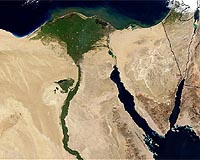| . |  |
. |
Caracas, Venezuela (UPI) May 25, 2010 The rainy season has brought timely relief to Venezuelan President Hugo Chavez, who faced mounting opposition pressures as chronic drought threatened to shut down the country's power generation system. At the height of the crisis earlier in 2010, caused by depleting water reserves that forced partial closure or malfunction of power generation turbines, Chavez publicly invoked the help of God and unveiled grandiose plans for manipulating clouds to induce rain. Although the drought was widely seen behind Venezuela's crippling power blackouts, opposition critics of Chavez blamed the crisis on poor government planning and inadequate investment in power generation units. More recently Chavez has said the country needs to diversify power generation sources and wants Venezuela's natural gas resources explored as an alternative to hydroelectric power. Several small power-generation units have been put into operation in recent weeks but opposition critics say the measures are late and inadequate. Venezuela's rainy reason is expected to last through mid-November if weather conditions don't change as they did in in 2009 with ruinous results for Venezuela's economy, Chavez's political reputation and credibility of the government's power generation strategy. Last month Chavez imposed a 60-day state of energy emergency as water levels in the Guri hydroelectric complex, one of the largest in the world, dropped to dangerous levels. About 73 percent of Venezuela's electricity is supplied by hydroelectric power stations, a dependence that Chavez wants to shake off. In December 2009 the state-owned Corporacion Electrica Nacional warned the power grid could collapse if there was no rainfall and if domestic water usage didn't go down. Chavez urged Venezuelans not to be complacent and remain prepared to cut back on electricity usage. He said the "electricity diet" imposed by the drought could soon come to an end if a disciplined response was followed. The drought has dented Chavez's standing in the opinion polls, raising risks of an opposition victory in September legislative elections, precursor to presidential elections in 2012. He said recovery of adequate water levels at the hydroelectric dams would be "bad news" for his opponents. Chavez called on Venezuelans to cut back on energy use by switching off lights and began putting in place energy-saving measures, including hefty cash fines and disconnection of supplies on those who are seen to be wasting electricity. Alternative energy plants, such as the Guri hydroelectric complex, supply about 82 percent of Venezuela's electricity needs. Chavez wants that share reduced and more funding redirected into renewable energy projects.
Share This Article With Planet Earth
Related Links Water News - Science, Technology and Politics
 Egypt, Kenya play down Nile water row
Egypt, Kenya play down Nile water rowCairo (AFP) May 24, 2010 Egypt and Kenya sought to play down a regional row following the signing by five African states of a new agreement on water-sharing opposed by Cairo. Kenya's visiting Prime Minister Raila Odinga praised the "strong relationship" between Cairo and Nairobi and stressed that the new agreement is "not anti-Egypt." "We are very concious of the fact that the economy of Egypt will not thrive wi ... read more |
|
| The content herein, unless otherwise known to be public domain, are Copyright 1995-2010 - SpaceDaily. AFP and UPI Wire Stories are copyright Agence France-Presse and United Press International. ESA Portal Reports are copyright European Space Agency. All NASA sourced material is public domain. Additional copyrights may apply in whole or part to other bona fide parties. Advertising does not imply endorsement,agreement or approval of any opinions, statements or information provided by SpaceDaily on any Web page published or hosted by SpaceDaily. Privacy Statement |